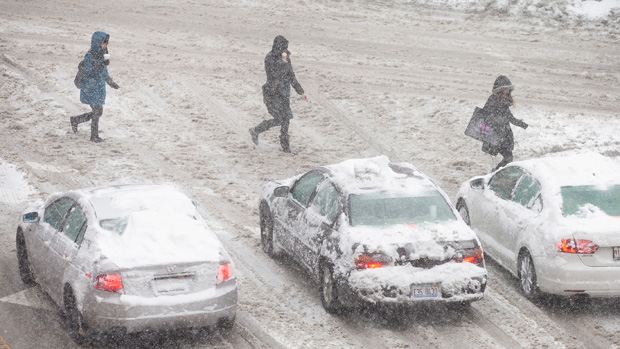Beast of the East and five other wacky weather names
From blood rain to a flying-cat tornado, dramatic weather nicknames are grabbing the headlines

A free daily email with the biggest news stories of the day – and the best features from TheWeek.com
You are now subscribed
Your newsletter sign-up was successful
The "Beast of the East" is coming to the UK this week, bringing snow, sleet and freezing cold temperatures. While it sounds like a monster of Biblical proportions, it is yet another wacky name for a bout of extreme weather. It refers to a wide plume of cold air arriving from Siberia, which is expected to leave parts of the UK feeling colder than Greenland. Here are some of the other dramatic names that have made their way into the weatherman's lexicon:
Blood rain
In October 2012, forecasters warned that the UK might be hit by "blood rain" ahead of Halloween. Winds arriving from the south were expected to bring rain clouds carrying dust and sand kicked up by storms in the Sahara desert. "After it rains it leaves behind a 'reddish' layer of dust which can coat houses and cars in tiny sand particles," explained the BBC. This strange spectacle is said to be more common in countries such as Spain and France as they are closer to Africa.
The Week
Escape your echo chamber. Get the facts behind the news, plus analysis from multiple perspectives.

Sign up for The Week's Free Newsletters
From our morning news briefing to a weekly Good News Newsletter, get the best of The Week delivered directly to your inbox.
From our morning news briefing to a weekly Good News Newsletter, get the best of The Week delivered directly to your inbox.
Snowmageddon
Governors across the northeast of America were busy declaring states of emergency last month as forecasters predicted several feet of snow. The blizzard was swiftly dubbed "Snowmageddon" as highways were shut down, public transport was stopped and members of the public were told to stay indoors. Some regions saw much less snow than predicted but the Snowmageddon moniker is yet to melt away.
Flying-cat tornado
This was one weather phenomenon that the Met Office had not predicted. Amid the erratic UK weather of January 2014, which included torrential rain, fierce winds, lightning and snow, a woman in Surrey claimed she saw a "flying-cat tornado". Shirley Blay, who keeps horses at a stable yard in Chobham, told the Daily Mirror: "We've got four feral cats in the yard and they were being lifted off the ground – about six foot off the ground – they just went round like a big paper bag. It was a mini tornado, I can't describe it as anything less." The Met Office said it was more likely to be a violent swirling gust than a tornado but did not rule it out.
A free daily email with the biggest news stories of the day – and the best features from TheWeek.com
Weather bomb
Last December, newspapers reported that a "weather bomb" had "exploded" across the country, bringing lightning strikes and winds of up to 144 mph on outlying islands. The Met Office admits it is "not a perfect meteorological term", but is certainly catchier than its scientific name "explosive cyclogenesis". It occurs when cold and warm air meet and the pressure at the centre of the storm drops dramatically, usually by at least 24 millibars in 24 hours, causing a vigorous storm.
Polar vortex
"Polar vortex" is also a real term used by the meteorological world, but appeared to gain popularity among headline-writers last year when the US was hit with freezing temperatures. It refers to a system of upper-level winds that circle over the poles, usually helping to keep the extremely cold air in. But when the winds weaken, the shape of the vortex can become distorted and large pockets of arctic air can move away from the polar regions, causing lower than normal temperatures elsewhere. ABC News describes it as the "most misused weather term of 2014", as many people used the term to describe each new pocket of cold air. "If the actual polar vortex was moving over the United States, we would have much bigger planetary problems to cope with," it said.